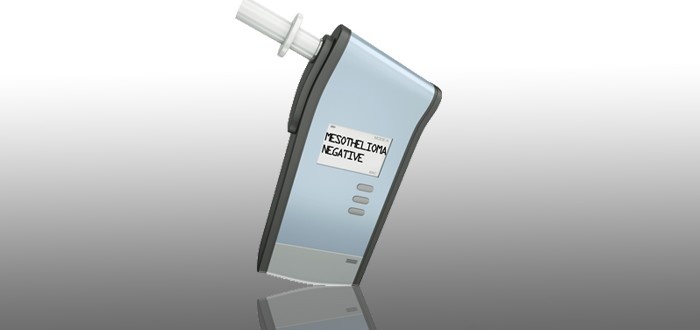In the near future, don’t think your mesothelioma doctor has lost his or her mind if, midway through a diagnosis exam, he or she casually reaches for a smartphone and tells you to blow on it.
Exhaling on a smartphone is how mesothelioma diagnoses might be conducted someday. The device that will make this possible is called a “sniffphone”.
A sniffphone is basically a smartphone harnessed to a breathalyzer machine — the same device police use to tell whether a motorist they’ve pulled over was driving under the influence of alcohol.
Apparently, disease causes chemical changes in the body and these changes emit an odor that’s unique to that particular disease. Heart disease smells one way and cancer another, the theory goes.
The technology being developed for the sniffphone is sophisticated enough to tell the difference between diseases.
Ultimately, if this proves successful, you’ll show up at the mesothelioma doctor’s office to see whether that asbestos exposure you suffered years earlier has caused the healthy cells on your mesothelium to turn cancerous. And just like that, you’ll have your answer.
If the technology works as hoped, you’ll even be told before mesothelioma strikes how many weeks or months away you are from its onset.
Earlier the Better for Mesothelioma Diagnosis
Early diagnosis and warnings could prove extremely advantageous. It’s well established in mesothelioma treatment circles that the earlier you get diagnosed, the sooner treatment can begin.
And the sooner treatment begins, the better your odds of long survival.
When you get right down to it, nothing could be speedier than having a mesothelioma diagnosis in hand almost the instant the test is performed.
According to published reports, the sniffphone will employ microsensors and nanosensors to characterize the scent emitted when you breathe into a special mask or mouthpiece that attaches to the phone.
The sensors will convey the information about your breath to an interpretation system the smartphone dials up.
The interpretation system, which might be located in another part of the country or overseas, almost immediately signals back your mesothelioma diagnosis — positive or negative.
Sniffing Out Mesothelioma
The use of odor to detect disease is not all that new. But only recently has the technology advanced to the point where electronic sniffphone-style analysis is feasible.
Cleveland Clinic, for example, used this type of technology last year to identify the explicit scent given off by patients who have cardiac disease.
The potential for sniffphone diagnosis is promising enough that the European Commission gave a $6.8 million grant to a consortium of research centers so they can further develop the technology.
The consortium includes Siemens — a major player in the medical technology field — along with several university-based research centers across Europe.
Leading the consortium is the Technion-Israel Institute of Technology, which is home to three Nobel Prize winners and has an affiliation with the Technion-Cornell Institute in New York City.
Point-man for the project is Technion Russell Berrie Nanotechnology Institute researcher Hossam Haick.
“The sniffphone is a winning solution,” said Haick. “It will enable immediate and early diagnosis that is both accurate and non-invasive. Early diagnosis can save lives, particularly in life-threatening diseases such as cancer.”

